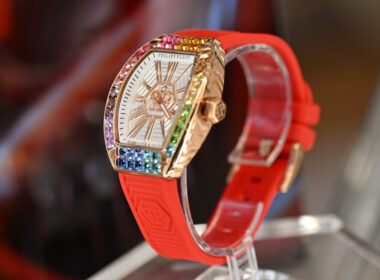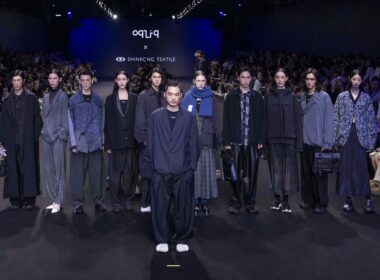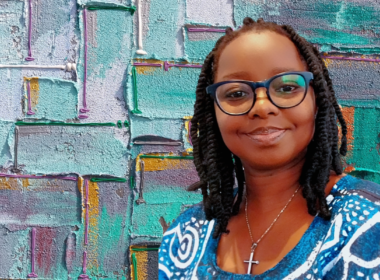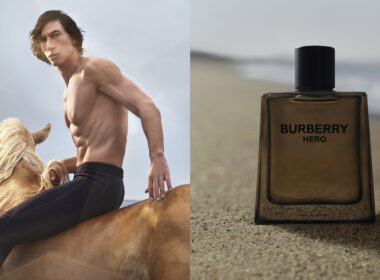Born in the Democratic Republic of Congo and raised in Italy, Elise Nzuzi embodies the fusion of Italo-Congolese culture. Her journey from a dreamer in Milan to a trailblazing creative director is a proof of her resilience and creativity. Elise’s story is one of embracing dual heritage, navigating challenges, and carving out a unique space in the fashion industry. Join us as we explore her inspiring life, where the final result of an event is an indescribable emotion, and discover the superhero behind the scenes.

Total look: Mario Dice @mariodicedesigner Shoes: Mario Valentino @mariovalentinoofficial Jewels: PDPAOLA @pdpaola_jewelry
FAB: What is the inspiration behind Miss Maltese?
Elise Nzuzi: I began my journey in fashion design at Naba Academy and later transitioned to marketing and communication in fashion. I approached my work artistically, putting my mind, story, and inspiration into it. However, I soon realised that I was always working for others, promoting their dreams and inspirations. Even though I received credit for my contributions, I remained in the background, working on projects that didn’t reflect my identity. I didn’t want to spend ten years telling other people’s stories. I needed to find myself, my identity, and my path, which led to the creation of Miss Maltese. I spoke with a family member who encouraged me, saying I had everything I needed to succeed. That night, I stayed awake, compiling my passions and experiences. It was then that I realised I could be more and truly become the person I wanted to be.
FAB: Could you give a glimpse into what a typical day backstage at a major fashion event looks like for you?
Elise Nzuzi: Backstage, you work with a team of about 20–30 people. If there’s a problem, they come to you because you’re the main person who can communicate with the videographer, light designer, models, casting directors, and stylists. Despite the challenges, the result of the fashion show always makes the hard work worthwhile.
FAB: How do you start an event day? Do you have a routine?
Elise Nzuzi: I always start a day before by writing down all the information about the team members and the tasks I need to accomplish, complete with a timeline. This way, I know exactly where I need to be at any given time. Before heading backstage, I take ten minutes alone to focus and centre myself. I don’t drink coffee to wake up or smoke. Even though I’m Italian, I don’t drink coffee.
FAB: Is there a story behind your not taking coffee?
Elise Nzuzi: When I was about six years old, I tried a cappuccino, and it made me very sick.
Since that day, anything related to coffee brings back that unpleasant memory. Instead, I take vitamins C and D to boost my immunity, especially during fashion weeks when I’m in contact with many people. This helps me stay healthy despite my busy and demanding schedule.
What happens after you study fashion at university?

Skirt: Mario Dice @mariodicedesigner
Shoes: Mario Valentino @mariovalentinoofficial Bag: JW Pei @jwpei_official
FAB: How does Miss Maltese foster a sense of community among young creatives in the fashion capitals? What impact have you seen from this effort?
Elise Nzuzi: I didn’t want others to go through the same challenges I faced. The fashion world can be really difficult. During your studies, universities provide you with everything you need to succeed. You can meet who you want and pursue your dreams. They educated us to be great and gave us opportunities to do fashion shows and network. However, six months before graduation, the support started to wane. Italy doesn’t have robust internship programmes like those in London and Paris. I was lucky to start working as a director right after university.
The main issue is that, after university, students often don’t receive the guidance they need to find their path. This problem is prevalent in Milan. When I began working, I spoke with ex-students who echoed my experience. They didn’t know what steps to take, where to go, or how to find a job. At Miss Maltese, we offer various work opportunities to students during fashion weeks, helping them build contacts. This way, when they finish university, they have a clearer direction.
If you were to write an article about this, you’d find that most fashion students share similar experiences. It’s challenging for them. Many students, after studying, return to their home countries because they can’t find opportunities. In my class of thirty-three students, only three stayed in Italy after graduation. The rest went back because they couldn’t find jobs.
Miss Maltese aims to address this by creating a community where artists can access information about their field. We also organise workshops, aperitifs, and party nights to connect creative minds. The fashion world is tough, and it’s important to highlight these challenges.
FAB: What are the most valuable lessons or experiences that the participants get from these exchanges?
Elise Nzuzi: Every year, we have a five-day exchange programme where students from London go to Milan, and students from Milan go to London or Paris to immerse themselves in the fashion world. They work as assistants, provide backstage support, and attend workshops. In just five days, they gain experiences they can’t get at university because the university only teaches you the basics. I want them to really get inside the fashion world and not be blindsided by its realities after graduation. Every time students participate in these programmes, they come back grateful. Some even say, “Thank you; I love this experience, which I didn’t imagine was so stressful.”
FAB: How do you believe Miss Maltese empowers young women in the fashion industry?
Elise Nzuzi: The fashion industry is inherently open. You can’t work in isolation. Fashion week takes you to New York, London, Milan, Paris, Berlin, and Copenhagen. Being part of that world means constant travel. You see photographers travelling from Mexico to Japan for a cover shoot.
If you want to be in fashion, you need to travel. It’s impossible to work in one place and gain the necessary experience. The fashion language varies in each country. London and Paris are avant-garde, with new designers every year. Milan has a more old-school vibe but remains elegant. Staying in one place means missing out on this diversity. I went to Bulgaria as a judge at a fashion show, and it was a completely different experience. They saw me differently.
Elise Nzuzi: The most difficult part was navigating the bureaucracy . Things move slowly in Paris. It’s easy to rent spaces for fashion shows for a few days, but getting your own showroom space is challenging. Having a dedicated space is crucial for the brands you represent . It’s the only thing missing for me to say, “I’m a successful woman with my showroom.”
FAB: You are from Congo; do you still have attachments to your motherland?
Elise Nzuzi: Yes, I do. A lot is happening in Goma. It’s 2024, and every time you go online, you find news. It’s hard for me because I’m Congolese, and the things I did with Miss Maltese and Eidiko Showroom don’t connect with my heritage. Miss Maltese operates in Milan, Paris, and London. For my country, I need to create a different concept. I will do something for my country and incorporate it into the message I give to students and those working with me.
FAB: Is there any unique insight or advantage you think you have gained from embracing your dual heritage?
Elise Nzuzi: I still have one project, but I need to return to my country first. I want to create an association in Kinshasa to help them sell their garment creations.
FAB: Who are some of the figures in the fashion industry who have inspired your journey, and what particularly do you find inspiring about them?
Elise Nzuzi: Ibrahim Kamal is a significant inspiration. He is a fashion stylist and designer for Off-White and the chief editor of Dazed. He started from nothing, unlike many in the fashion industry who have privileged backgrounds. If you look at many big brands, you can trace their family heritage. Ibrahim, however, created a revolution in the industry. He infused African style into mainstream fashion. His campaign for Chanel in Senegal, for example, was remarkable. He is young, about half my age, and his ability to integrate African heritage into fashion is inspiring. It’s something I aspire to achieve. Stay up to date on the latest in fashion, arts, beauty, and lifestyle by following FAB L’Style Magazine.
FAB: Looking back, what advice would you give to your younger self, and what would you tell aspiring creatives who look up to you?
Elise Nzuzi: If you want to do something, do it at that moment. The fashion world is fast-paced, and opportunities don’t wait. If you feel you can contribute something, don’t wait for the ‘right moment’. No one will give you the right moment. You need to stand up and find it yourself. Don’t wait for promises or opportunities to come your way. Sure, they can happen, but after two or three years, things change. If you want your moment, you have to seize it.

Skirt: Mario Dice @mariodicedesigner
Shoes: Mario Valentino @mariovalentinoofficial Bag: JW Pei @jwpei_official
Fun Zone: #FABFastFive
FAB: If you had 25 hours in a day, what would you do for an extra hour?
Elise: I would run. It’s good for the mind.
FAB: What is your favourite indoor activity?
Elise: Making cakes and reading books.
FAB: What would you teach every child on the planet if you had a chance?
Elise: I would teach them how to be creative in the fashion world and how to have self-confidence.
FAB: Summer or Winter?
Elise: Summer
FAB: What is the most beautiful country you have ever visited?
Elise: I have travelled extensively, and I can say with certainty that Italy is my favourite.
More Like This:
How to Clear Your Mind With a Brain Dump
Style meets substance, Eco-chic meets Green Glamour in Elise Daniel Bags











